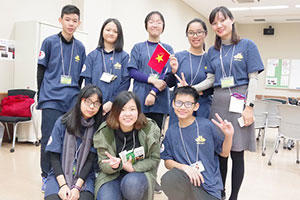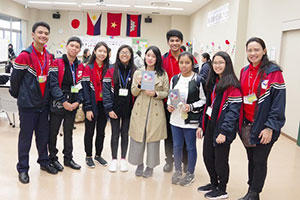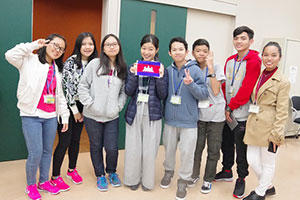TUFS Students Volunteer Language Support for ASEAN Middle School Students
January 16, 2018
On Saturday the 21
st
and Sunday the 22
nd
of October, the 'ASEAN Middle School Student Invitational Exchange Project' (sponsored by the National Chuo Youth Friendship Center) was held in Gotemba, Shizuoka, at which three TUFS students participated as language support for the 'Japan-ASEAN Middle School Student Discussion.'
This experience was very valuable for the TUFS students, as they were able to hold discussions and parties with the middle school students from each country. This project aims to work towards promoting an international way of thinking in the youth of today to correspond with a global society, and to train human resources that can contribute towards developments between Japan and ASEAN countries. TUFS also participated in this project in 2016.
More details on this event can be found on the
Volunteer Action Space (VOLAS) website .
< Reflections from the Volunteers >
Nanami Ozaki (School of Language and Culture Studies, Vietnamese Department, third year)
This time, I was an interpreter for the first time in my life. I didn't study enough, and have little experience with interpreting, so I felt that I couldn't carry out my role as interpreter to a satisfactory degree, which was a frustrating and regrettable experience.
 When the Japanese middle school students were giving presentations about Japanese history and annual events, I couldn't think of how to explain some of the inherently Japanese words in Vietnamese, and so I couldn't really translate them well.
When the Japanese middle school students were giving presentations about Japanese history and annual events, I couldn't think of how to explain some of the inherently Japanese words in Vietnamese, and so I couldn't really translate them well.
I feel sorry for the Vietnamese students. However, thanks to this volunteer opportunity I feel motivated to study more, so it was an important experience.
The kids from ASEAN (Vietnam, the Philippines, and Cambodia) were so sweet, well-behaved, clever, and fantastic. The Japanese students were great too, they listened carefully, and although they seemed a little embarrassed, it was impressive seeing them mustering up the courage to speak with the ASEAN students in English.
This experience made me think that, if an event/project like this is held again, I definitely want to help out.
Miho Kato (School of Language and Culture Studies, Filipino Department, third year)
It was my first time interpreting, but along with feeling the difficulty of the task, I was also able to feel a sense of enjoyment.
 As well as interpreting, I learnt many helpful things, including Cambodian and Filipino social issues, differences between Vietnamese and Japanese culture and customs, and above all the rich abundance of ideas that children have, and how they present them.
As well as interpreting, I learnt many helpful things, including Cambodian and Filipino social issues, differences between Vietnamese and Japanese culture and customs, and above all the rich abundance of ideas that children have, and how they present them.
It was an opportunity that allowed me to be motivated by the young generation, and I was able to have an enjoyable and meaningful time.
After coming back from my exchange, I didn't have many chances to actually use Tagalog in Japan, so I think this event was a very valuable chance for me to be able to speak Tagalog with Filipino people, and to also meet and speak with people from ASEAN countries.
Aya Saito (School of Language and Culture Studies, Cambodian Department, third year)
The discussion was mostly in English, and it was difficult translating it into proper Japanese.
 The presentations were on the culture and society of my specialty area, so I was able to understand them immediately. I hope I was able to provide a fairly easy to understand translation.
The presentations were on the culture and society of my specialty area, so I was able to understand them immediately. I hope I was able to provide a fairly easy to understand translation.
I acted as interpreter for the 'Country Representative's Debate,' which was a very significant opportunity, and through hearing introductions and problems of each country from the students' points of view, I was able to see the differences in education and awareness of issues in each country.
I hope to use this discovery, which couldn't have been made through only looking at Japan or my specialty area, in my everyday life and further research.
I'd be extremely happy if I was able to be of some use to the students' understanding of foreign cultures.
